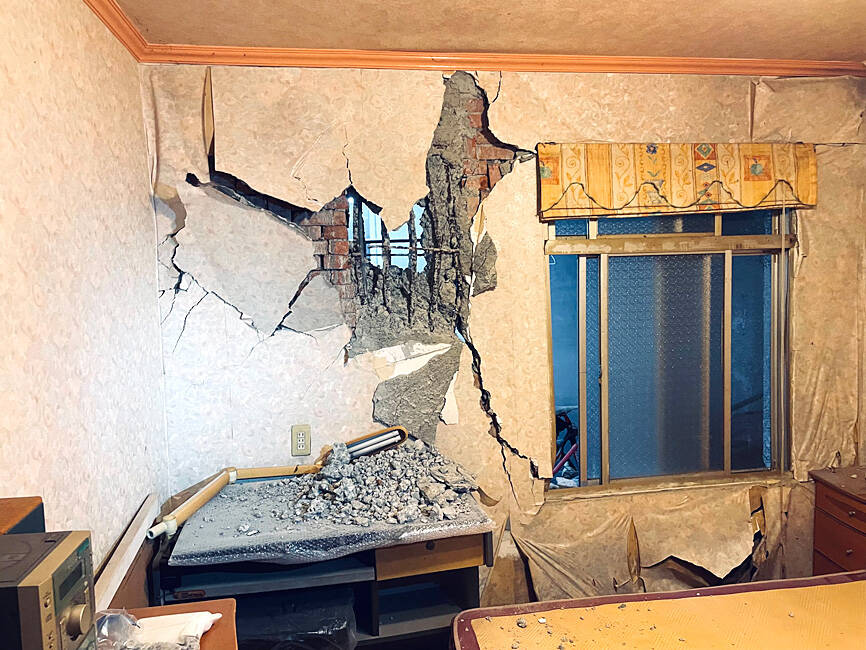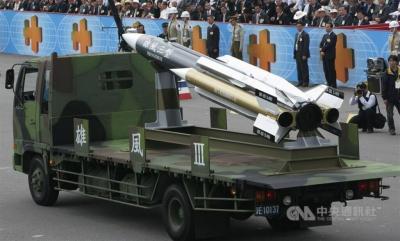The National Land Management Agency doled out subsidies to 70 projects to strengthen buildings against earthquakes in nine administrative regions from January to last month, it said on Tuesday.
The quake-proofing projects consisted of 20 in Taipei, 16 in New Taipei City, 10 in Taitung County, eight in Tainan, six in Pingtung County, four in Hualien County, three in Yilan County, two in Yunlin County and one in Taichung, including completed and ongoing projects, the agency added.
The three completed projects in Hualien survived the April 3 earthquake, which measured 7.2 on the Richter scale, with no signs of structural damage, the agency said.

Photo courtesy of the New Taipei City Public Works Department
Taiwan revamped its building code after the catastrophic 921 Earthquake, which resulted in a large improvement in safety standards for buildings across the nation, Taiwan Structural Engineers Association executive director Chiang Shih-hsuang (江世雄) said.
The 921 quake, which occurred on Sept. 21, 1999, measured 7.3 on the Richter scale and left 2,456 people dead and 10,718 injured, and destroyed 53,661 houses.
Despite the nation’s best efforts, the earthquake resistance of many concrete structures 30 years or older remains less than ideal, while structures nearing the end of their 50-year service life need to be torn down, Chiang said.
Reinforced brick, wood and stone construction of all kinds, many of which are older, need to be comprehensively re-examined for their ability to withstand quakes, he said.
An example of a common unsafe building design is structures at street corners with ground-level shop fronts on both sides with a glass facade, Chiang said.
Buildings with excessive volumes of empty internal space, such as big lobbies with tall ceilings, are another example of popular architectural styles that are highly risky, he added.
These types of buildings suffer from a lack of structural walls and pillars relative to their size and can be found all over Taiwan, Chiang said.
About 9.19 million properties are registered as residential buildings, of which 65.53 percent are made of concrete and 18.4 percent are made of reinforced brick, government data showed.
Older buildings in Taiwan often feature ground levels designed to yield a maximum of floor space and emphasize openness and lighting, said Andy Huang (黃舒衛), director of Landlord Representation Services at Colliers International Taiwan.
These practices, in many cases, violate safety codes, resulting in structures that must be overhauled to comply with the more rigorously written and enforced modern safety laws, Huang said.
As outdated buildings are the least likely to attract tenants, landlords owning unsafe properties often lack money to refurbish them, creating a vicious cycle, Huang added.

STATS: Taiwan’s average life expectancy of 80.77 years was lower than that of Japan, Singapore and South Korea, but higher than in China, Malaysia and Indonesia Taiwan’s average life expectancy last year increased to 80.77 years, but was still not back to its pre-COVID-19 pandemic peak of 81.32 years in 2020, the Ministry of the Interior said yesterday. The average life expectancy last year increased the 0.54 years from 2023, the ministry said in a statement. For men and women, the average life expectancy last year was 77.42 years and 84.30 years respectively, up 0.48 years and 0.56 years from the previous year. Taiwan’s average life expectancy peaked at 81.32 years in 2020, as the nation was relatively unaffected by the pandemic that year. The metric

Taiwan High Speed Rail Corp. (THSRC) plans to ease strained capacity during peak hours by introducing new fare rules restricting passengers traveling without reserved seats in 2026, company Chairman Shih Che (史哲) said Wednesday. THSRC needs to tackle its capacity issue because there have been several occasions where passengers holding tickets with reserved seats did not make it onto their train in stations packed with individuals traveling without a reserved seat, Shih told reporters in a joint interview in Taipei. Non-reserved seats allow travelers maximum flexibility, but it has led to issues relating to quality of service and safety concerns, especially during

A magnitude 5.1 earthquake struck Chiayi County at 4:37pm today, the Central Weather Administration (CWA) said. The hypocenter was 36.3km southeast of Chiayi County Hall at a depth of 10.4km, CWA data showed. There were no immediate reports of damage resulting from the quake. The intensity of the quake, which gauges the actual effect of a seismic event, measured 4 in Chiayi County, Tainan and Kaohsiung on Taiwan's seven-tier intensity scale, the data showed. The quake had an intensity of 3 in Chiayi City and Yunlin County, while it was measured as 2 in Pingtung, Taitung, Hualien, Changhua, Nantou and Penghu counties, the data

The Supreme Court today rejected an appeal filed by former Air Force officer Shih Chun-cheng (史濬程), convicted of Chinese Communist Party (CCP) espionage, finalizing his sentence at two years and two months for contravening the National Security Act (國家安全法). His other ruling, a ten-month sentence for an additional contravention, was meanwhile overturned and sent to the Taichung branch of the High Court for retrial, the Supreme Court said today. Prosecutors have been notified as Shih is considered a flight risk. Shih was recruited by Chinese Communist Party (CCP) intelligence officials after his retirement in 2008 and appointed as a supervisor